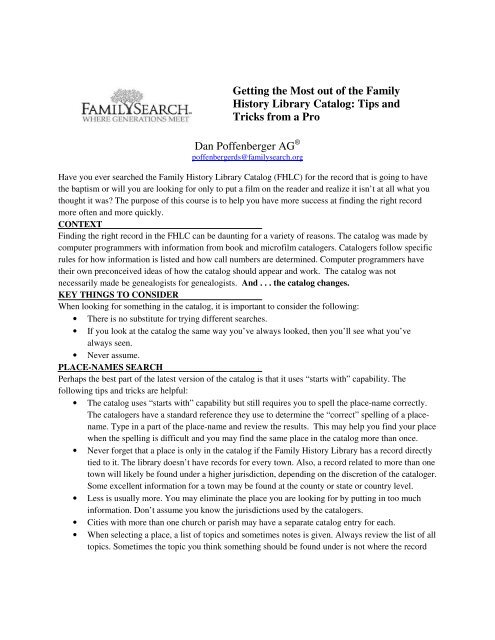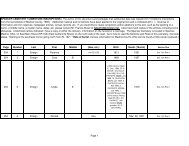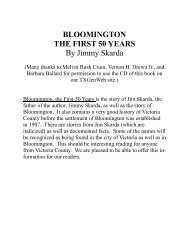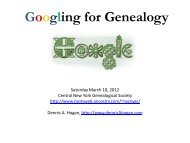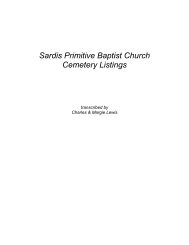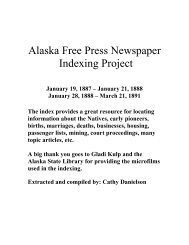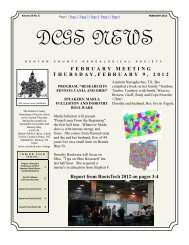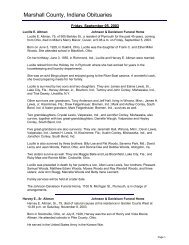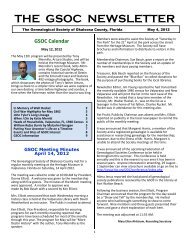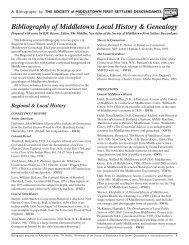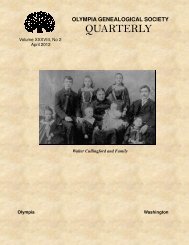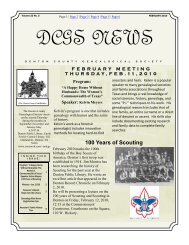Getting to the Roots of Your Family - RootsWeb - Ancestry.com
Getting to the Roots of Your Family - RootsWeb - Ancestry.com
Getting to the Roots of Your Family - RootsWeb - Ancestry.com
Create successful ePaper yourself
Turn your PDF publications into a flip-book with our unique Google optimized e-Paper software.
<strong>Getting</strong> <strong>the</strong> Most out <strong>of</strong> <strong>the</strong> <strong>Family</strong><br />
His<strong>to</strong>ry Library Catalog: Tips and<br />
Tricks from a Pro<br />
Dan P<strong>of</strong>fenberger AG ®<br />
p<strong>of</strong>fenbergerds@familysearch.org<br />
Have you ever searched <strong>the</strong> <strong>Family</strong> His<strong>to</strong>ry Library Catalog (FHLC) for <strong>the</strong> record that is going <strong>to</strong> have<br />
<strong>the</strong> baptism or will you are looking for only <strong>to</strong> put a film on <strong>the</strong> reader and realize it isn’t at all what you<br />
thought it was? The purpose <strong>of</strong> this course is <strong>to</strong> help you have more success at finding <strong>the</strong> right record<br />
more <strong>of</strong>ten and more quickly.<br />
CONTEXT<br />
Finding <strong>the</strong> right record in <strong>the</strong> FHLC can be daunting for a variety <strong>of</strong> reasons. The catalog was made by<br />
<strong>com</strong>puter programmers with information from book and micr<strong>of</strong>ilm catalogers. Catalogers follow specific<br />
rules for how information is listed and how call numbers are determined. Computer programmers have<br />
<strong>the</strong>ir own preconceived ideas <strong>of</strong> how <strong>the</strong> catalog should appear and work. The catalog was not<br />
necessarily made be genealogists for genealogists. And . . . <strong>the</strong> catalog changes.<br />
KEY THINGS TO CONSIDER<br />
When looking for something in <strong>the</strong> catalog, it is important <strong>to</strong> consider <strong>the</strong> following:<br />
• There is no substitute for trying different searches.<br />
• If you look at <strong>the</strong> catalog <strong>the</strong> same way you’ve always looked, <strong>the</strong>n you’ll see what you’ve<br />
always seen.<br />
• Never assume.<br />
PLACE-NAMES SEARCH<br />
Perhaps <strong>the</strong> best part <strong>of</strong> <strong>the</strong> latest version <strong>of</strong> <strong>the</strong> catalog is that it uses “starts with” capability. The<br />
following tips and tricks are helpful:<br />
• The catalog uses “starts with” capability but still requires you <strong>to</strong> spell <strong>the</strong> place-name correctly.<br />
The catalogers have a standard reference <strong>the</strong>y use <strong>to</strong> determine <strong>the</strong> “correct” spelling <strong>of</strong> a placename.<br />
Type in a part <strong>of</strong> <strong>the</strong> place-name and review <strong>the</strong> results. This may help you find your place<br />
when <strong>the</strong> spelling is difficult and you may find <strong>the</strong> same place in <strong>the</strong> catalog more than once.<br />
• Never forget that a place is only in <strong>the</strong> catalog if <strong>the</strong> <strong>Family</strong> His<strong>to</strong>ry Library has a record directly<br />
tied <strong>to</strong> it. The library doesn’t have records for every <strong>to</strong>wn. Also, a record related <strong>to</strong> more than one<br />
<strong>to</strong>wn will likely be found under a higher jurisdiction, depending on <strong>the</strong> discretion <strong>of</strong> <strong>the</strong> cataloger.<br />
Some excellent information for a <strong>to</strong>wn may be found at <strong>the</strong> county or state or country level.<br />
• Less is usually more. You may eliminate <strong>the</strong> place you are looking for by putting in <strong>to</strong>o much<br />
information. Don’t assume you know <strong>the</strong> jurisdictions used by <strong>the</strong> catalogers.<br />
• Cities with more than one church or parish may have a separate catalog entry for each.<br />
• When selecting a place, a list <strong>of</strong> <strong>to</strong>pics and sometimes notes is given. Always review <strong>the</strong> list <strong>of</strong> all<br />
<strong>to</strong>pics. Sometimes <strong>the</strong> <strong>to</strong>pic you think something should be found under is not where <strong>the</strong> record


